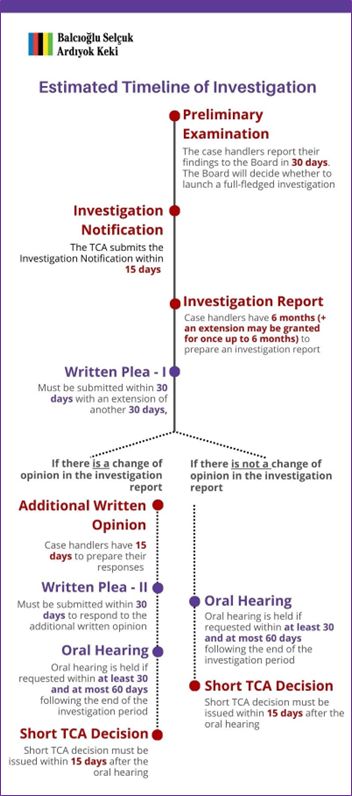The recent amendments to Act No. 4054 on the Protection of Competition signify a profound transformation in the administrative procedures governing competition investigations in Turkey. Enacted through Act No. 7511, these amendments came into force on May 29, 2024, and have introduced substantial changes to the rights of defense for parties under investigation. This article delves into the details of these amendments, examining their implications for both ongoing and future investigations, and explores how they reshape the landscape of competition law enforcement in Turkey.
Let's Remember Pre-Amendment Procedure
Before the Amendment, the investigated parties could submit three written defences in different stages of the investigation. The first written defense was to be submitted within 30 calendar days following Investigation Notice. The case handlers (i.e., the Investigation Committee) had 6 months to prepare the Investigation Report. The Turkish Competition Authority ("TCA") could grant an extension for once up to 6 months to the Investigation Committee to conclude the investigation.
Following the Investigation Report, investigated party could submit its second written defense within the 30 calendar days, which could be extended for another 30 days. Following the submission of second written defense, the Investigation Committee had 15 calendar days to respond in writing (i.e., Additional Written Opinion). The TCA usually provided an extension of 15 calendar days to the case handlers, which is also possible by the law.
After the notification of the Additional Written Opinion, it was time for the investigated party to prepare its third and last written defense) within 30-calendar-day, which again could be extended 30 days. Upon the submission of the third written defense, written phase of the investigation process was completed.
Oral hearing would be held upon request by the parties, or the TCA may also ex officio decide to hold an oral hearing. Oral hearings were held within 30 to 60 days following the completion of the written phase. In practice, the TCA held an oral hearing for almost all of its investigations.
Now it is time to see how the amendments affects the investigation procedure.
Abolition of the First Written Defense
One of the most significant changes brought about by the amendments is the complete abolition of the first written defense. Under the previous procedures, parties had the opportunity to submit three written defenses at various stages of the investigation process. This procedural safeguard allowed parties to respond comprehensively to allegations and present their arguments in detail. However, with the new amendments, the right to the first written defense, which was submitted in response to the investigation notice, has been entirely removed. This change marks a departure from the previous, more extended procedural framework and signals a shift towards a more streamlined process.
Conditional Additional Written Opinion and Written Defense
Another major change involves the issuance of additional written opinions by the Investigation Committee. Under the previous system, the committee was obliged to provide an additional written opinion regardless of its stance on the allegations. The new amendments introduce a conditional approach: The Investigation Committee is required to issue an additional written opinion only if it changes its initial opinion presented in the investigation report. If the committee maintains its original stance, no additional opinion will be issued, effectively eliminating the right to a third written defense. Parties can submit another written defense only if the Investigation Committee change its stance and issue additional written opinion. Another change regarding the additional written opinion and conditional written defense is the elimination of the opportunity to extend the time. This reduction in written defenses from three to one or, in some cases, two, signifies a more efficient but potentially more challenging process for the parties involved.

Impact on Ongoing Investigations
The immediate implementation of these amendments, without a transition period, is a critical aspect. This means that any investigation notices served on or after May 29, 2024, do not necessitate a first written defense. Furthermore, for investigation notices served before this date, the right to submit a first written defense is also considered abolished. This abrupt implementation may cause confusion and necessitates a rapid adjustment by parties under investigation. However, it underscores the legislative intent to expedite and streamline the investigation process, reducing potential delays associated with multiple written submissions.
Importance of the Remaining Written Defense
Given the reduction in the number of written defenses, the significance of the remaining written defense has increased substantially. This defense, submitted in response to the Investigation Report, now bears the full weight of the party's arguments and counterpoints. It is crucial for parties to craft this defense meticulously, as it may be the sole written opportunity to influence the Investigation Committee's and the Competition Board's decision. In cases where the Committee changes its opinion based on this defense, an additional written opinion may be issued, providing another written defense opportunity. Thus, the strategic importance of this single written defense cannot be overstated.
Right to Oral Defense (Hearing) Unchanged
Despite the significant changes to written defenses, the right to an oral defense remains unchanged. Parties can still request an oral defense, providing a crucial opportunity to present their case directly to the Investigation Committee. This oral hearing allows for a dynamic exchange of arguments and can be pivotal in swaying the committee's opinion. Given the reduced written defenses, the oral defense gains even greater importance as a platform for parties to advocate their positions and address any remaining concerns of the committee.
Shortened Investigation Timelines
The amendments are designed to expedite the overall investigation process. By making the issuance of an additional written opinion conditional, the investigation timelines are slightly shortened. Under the previous system, the investigation phase included multiple stages of written defenses, which extended the duration of investigations. In the new framework, if no additional written opinion is issued, the investigation phase can conclude up to 90 days earlier. Even when an additional written opinion is provided, the elimination of extensions for this process means the investigation phase is shortened by 45 days. This acceleration of timelines is intended to enhance the efficiency of the Turkish Competition Authority in handling cases.
No Impact on Settlement and Commitment Processes
It is important to note that the amendments do not affect the processes for settlement and commitment. These procedures remain governed by the same timelines as before, calculated based on the notification of the investigation report and the notice of investigation, respectively. However, given the elimination of the first written defense, parties are advised to provide more detailed and comprehensive submissions during settlement applications. This proactive approach ensures that all relevant arguments regarding the scope and duration of the alleged violations are adequately addressed early in the process.
Potential Challenges and Considerations
While the amendments aim to streamline the investigation process, they also present potential challenges. The immediate implementation without a transition period requires parties to quickly adapt to the new framework. The reduction in written defenses means that parties must present their arguments more concisely and effectively within a limited timeframe. Additionally, the conditional issuance of additional written opinions could lead to uncertainties about the exact timeline and procedural steps. Parties must remain vigilant and proactive in their responses to ensure that their rights and interests are adequately protected throughout the investigation.
Conclusion
The amendments to Act No. 4054 on the Protection of Competition represent a significant shift in the procedural landscape of competition law in Turkey. By reducing the number of written defenses and shortening investigation timelines, these changes aim to make the process more efficient and timelier. While the immediate implementation may pose challenges, the long-term effects are expected to streamline competition investigations and enhance the effectiveness of the Turkish Competition Authority.
For parties under investigation, it is crucial to adapt swiftly to these new procedures. Ensuring robust and well-prepared defenses within the new framework is essential to effectively advocate their positions. The era of multiple written defenses has ended, and a new period of competition law enforcement in Turkey has begun. Time will tell how these changes will impact the overall landscape of competition law, but they undoubtedly mark the beginning of a new and more efficient era in competition investigations.
The content of this article is intended to provide a general guide to the subject matter. Specialist advice should be sought about your specific circumstances.



